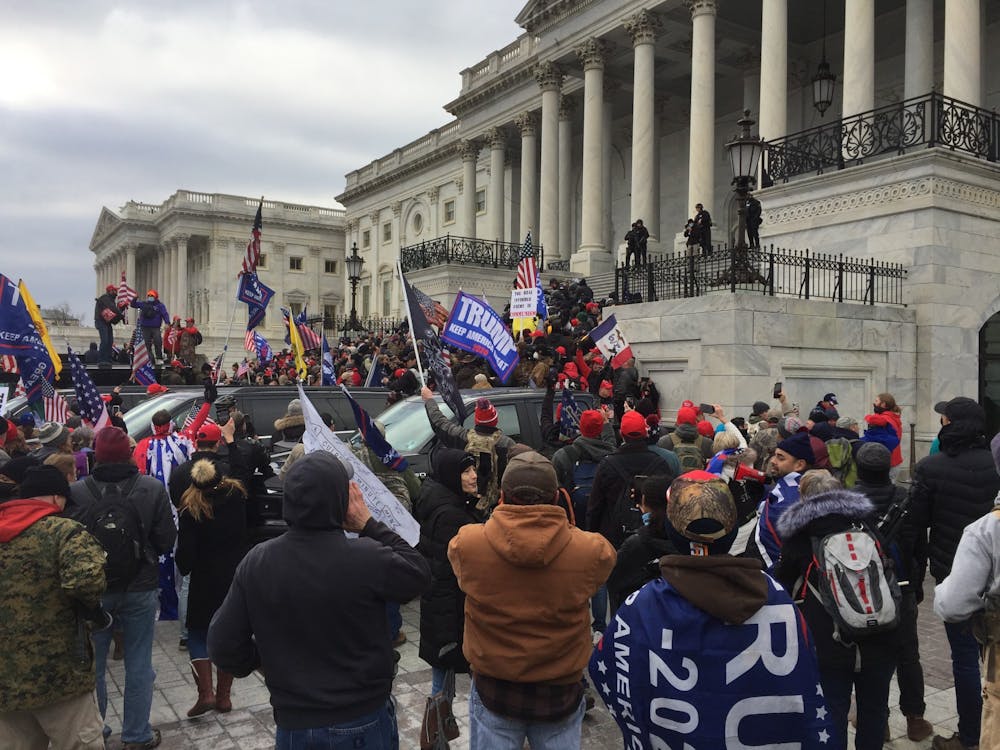In the last week of my religion class — REL 364: Love and Justice, taught by Professor Eric Gregory — we discussed “The Hidden Wound” by Wendell Berry, an essay detailing the damage racism has inflicted on America. In the opening paragraph, Berry states that he too had long been “unwilling until now to open in [himself]” a “historical wound, prepared centuries ago to come alive in [him] at [his] birth like a hereditary disease.” Berry’s acknowledgement of the historical wound, white supremacy, that lies within the consciousness of every American has never been more relevant than in contemporary discourse surrounding the storming of the United States Capitol.
Following the events of Jan. 6, we have borne witness to various reactions: a motley of political commentators ranging from FOX News to CNN were quick to condemn the actions of the insurgents, who decided that allegiance to one of the most divisive and spiteful of America’s modern presidents mattered more than America’s democracy.
Pundits and journalists seemed shocked that the rhetoric of former U.S. President Trump, congresspeople, and senators such as Princeton's own Ted Cruz ’92 (R-T.X.), would be capable of producing such disastrous consequences. Despite the variety of approaches taken to critique the depiction of domestic terrorism, they all seemed to agree on one thing: ‘This is not who we are.’
Instagram stories, tweets, and even President Joe Biden all used similar wording: “America is so much better than what we’re seeing today.”
Initially, I, too, had similar reactions. After further interrogation, however, I realized that instead of the question, ‘Is this who we really are?’, the question really worth asking is: ‘Why are we so surprised that this is the country we live in?’.
America flaunts herself under the pretense of values of life, liberty, the pursuit of happiness, and the equality of all, yet has consistently failed to affirm those values since her establishment. Rather, history reveals to us that it is the lack of these ideals that makes America, America.
Where were these ideals when Americans decided to enslave an entire African people and march westward, committing genocide against Indigenous people, stripping them both of their culture and humanity? Where were these ideals when white Americans made it as hard as possible for African Americans to vote, overthrew government after government in Latin America and the Middle East, and established internment camps for Japanese Americans?
If these ideals were missing then, why are we surprised that they are missing now? White supremacy is a constant in both our past and our present.

Furthermore, why do we continue to buy into the lies of American innocence and exceptionalism, when the representatives we elect, our community, and even members of our own family repeatedly prove to us how false these lies are?
It is because we would much rather ‘move forward’ than stop in our tracks to look our horrid past straight in its eyes, and do the work necessary to address the damage we have inflicted on each other and society.
When I hear the words ‘heal’ and ‘move forward,‘ both from Republican congresspeople who stoked the flames of the attempted coup and from President Biden’s message of unity, I am reminded of Berry’s diagnosis of the historical wound — that we as Americans would much rather bury our past in faux-patriotism and empty platitudes than do anything to address it.
Addressing white supremacy is hard. Addressing it means acknowledging that Princeton alumni like Ted Cruz, who was an enabler of domestic terrorism, no longer deserve a space in our community because of their attacks on democracy. Addressing it means actively fighting and rebuking the mentalities that contributed to the trauma that so many BIPOC students suffered throughout their Bridge Year experiences. Addressing it means constantly checking our American subconscious, not by glossing over the iniquity of our shared past, but by facing it head on and fixing it. Addressing it means no longer tolerating the blatant white supremacy present in all the nooks and crannies of American society, from our policing to our U.S. History textbooks.

To properly heal the hidden wound of white supremacy that afflicts all of us was Berry’s goal. As Princetonians who should be dedicated to service, to ‘move forward’ and gloss over the past as opposed to taking the time in this moment to address our wrongs would be to once again bask in the lies we have preached since the founding of this nation.
Etiosa Omeike is a first-year from New York. He can be reached at jomeike@princeton.edu.








